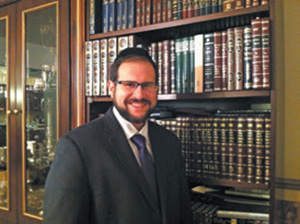
Someone once told me that when people ask each other how they are doing, they mean besides the fact that they’re tired. It’s as if they are saying, “I know you’re tired; that goes without saying. But besides that, how are you?”
This past week, we switched back to Eastern Standard Time. Most people were very excited by the change, simply because it meant one hour of extra sleep.
But it all depends how you look at it. In his weekly call-in shiur this past Thursday, Rabbi Yisroel Reisman encouraged everyone to take advantage of the extra hour to use it wisely. He noted that his Navi shiur begins at 8:30, and if someone comes at 8:30 and changes his clock at the end of the shiur, he can also leave at 8:30. An hour of no-cost learning.
As parents of young children, we don’t seem to share the excitement. It seems we forgot to tell our 14-month-old twins about the time change. On Sunday morning at 4:55 a.m., they were rearing to go, ready for the new day. I don’t even know if it’s legal to wake up that early on a Sunday morning in the United States. But they wouldn’t listen to our pleading and begging.
The first of the 13 brachos recited each morning thanks Hashem “Who gave the sechvi understanding to differentiate between day and night.”
There are two opinions as to what is the definition of “sechvi.” One opinion is that it is a reference to the heart, and we are thanking Hashem for giving us the ability to differentiate between night and day. The second opinion is that it refers to the rooster, which begins its call in the wee hours of the morning, marking the end of night and the commencement of the new day.
Rav Zundel Kroizer zt”l (Siddur Ohr Hachama) notes that virtually all animals can discern the difference between daylight and nighttime. The uniqueness of the rooster is that it can sense the impending morning immediately at daybreak, when it is yet completely dark outside and the first crack of dawn is hardly discernible.
It is for this reason that in the text of the bracha we thank Hashem for giving the knowledge “to differentiate between day and between night.” Prima facie, it would seem more accurate to say “between night and day.” However, as has been explained, the bracha is thanking Hashem for granting the rooster the ability to realize the new day even when it is still completely dark outside and it seems like it is still night. Most of the world only recognizes the new day when the sun rises above the horizon. The rooster, however, senses that the day has begun even before the sun has started its ascent.
As our clocks fall back to Eastern Standard Time, we begin a stretch of the year when most of us begin our morning when it is still dark outside. David Hamelech states, “A-ira shachar—I wake the dawn.” Unlike the kings of the world, David Hamelech began his day during the end of the night. He woke the dawn instead of vice versa.
In a sense, this is a historical strength of the Jewish people, who have always hoped and yearned for the rising sun, even amidst the darkness.
Still, I hope that even as Hashem grants the rooster, and our hearts, the knowledge of a new day even while it’s still dark, He allows our twins to sleep, at least a little past dawn. Amen.
By Rabbi Dani Staum
Rabbi Dani Staum, LMSW, is the rabbi of Kehillat New Hempstead as well as a rebbe and the guidance counselor at Heichal HaTorah in Teaneck, New Jersey, principal at Mesivta Ohr Naftoli of New Windsor, as well as a division head at Camp Dora Golding. He also presents parenting classes based on the acclaimed Love and Logic methods. His email address is [email protected]. His website is: www.stamtorah.info.










